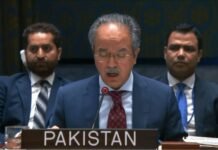Pakistan 6 June 2023 (TDI): Foreign Minister of Pakistan Bilawal Bhutto Zardari addressed the Pakistan-Iraq business forum, comprising entrepreneurs of both countries.
He urged the business community to expand collaboration in the fields of IT, food security, energy, construction, and medicines.
In a speech, he urged that the two nations’ collaboration in these fields has the potential to be mutually beneficial and help both countries flourish and prosper overall.
With a trained workforce and a developing technology industry, Pakistan has become a major player in the IT industry. To improve its own IT infrastructure and capabilities, Iraq can benefit from Pakistan’s competence in software development, IT services, and digital solutions.
Knowledge sharing, technology transfer, and capacity building can all be facilitated through collaboration in IT, which could promote Iraq’s e-governance, digital connectivity, and IT-based institutions in Iraq.
When it comes to tackling issues with agricultural productivity, food production, and distribution, both counties can work together. Pakistan has extensive knowledge of agricultural processes, such as animal management, crop production, and irrigation methods.
Also Read: Pakistan and Iraq to enhance bilateral ties
By exchanging best practices, information, and agricultural technologies, Iraq may increase its food security and increase its agricultural production’s self-sufficiency.
Pakistan’s expertise in building, project management, and engineering services can help Iraq with its rehabilitation efforts and infrastructure needs. To help the development of Iraq’s infrastructure and speed up its reconstruction process, collaboration can encompass collaborative projects, contract bidding, and skill transfer.
In order to fulfill Iraq’s expanding energy needs and provide a steady energy supply, cooperation in the energy sector might be extremely important. Pakistan has knowledge in both conventional and renewable energy sources, as well as other energy-related fields.
Investments in energy infrastructure, joint ventures for oil and gas exploration, and the sharing of knowledge about renewable energy technology are all examples of collaborative initiatives. Such cooperation can support sustainable growth and increase Iraq’s energy security.
Sharing medical knowledge, developing healthcare infrastructure, and training programs are all examples of collaboration in the medical industry. Pakistan has a strong medical workforce and an established healthcare system.
In healthcare administration, medical research, and the exchange of medical personnel, cooperation might entail knowledge sharing.
By working together, Iraq’s healthcare capabilities might be improved, and access to quality healthcare services and strengthening the healthcare infrastructure in the country.
Increasing cooperation in these areas not only improves bilateral ties between Pakistan and Iraq but also promotes human development, economic progress, and regional stability. Both nations may address shared issues, advance sustainable development, and promote reciprocal prosperity by utilizing one another’s assets.
Platforms for the efficient execution and oversight of cooperative efforts can be provided by frequent high-level exchanges, collaborative working groups, and institutional collaborations.
Khadija Asif is a excellent writer and researcher in a profound field of International Relations. She had done graduation in International Relations from Lahore College for Women University. She possesses a diverse knowledge in various areas such a diplomacy, social and global issues. She had a outspoken communication skills and also have a ability to search on various social and global issues in global dynamics. She can be reached via email @deejukhan2504@gmail.com








